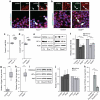Tau promotes neurodegeneration through global chromatin relaxation
- PMID: 24464041
- PMCID: PMC4012297
- DOI: 10.1038/nn.3639
Tau promotes neurodegeneration through global chromatin relaxation
Abstract
The microtubule-associated protein tau is involved in a number of neurodegenerative disorders, including Alzheimer's disease. Previous studies have linked oxidative stress and subsequent DNA damage to neuronal death in Alzheimer's disease and related tauopathies. Given that DNA damage can substantially alter chromatin structure, we examined epigenetic changes in tau-induced neurodegeneration. We found widespread loss of heterochromatin in tau transgenic Drosophila and mice and in human Alzheimer's disease. Notably, genetic rescue of tau-induced heterochromatin loss substantially reduced neurodegeneration in Drosophila. We identified oxidative stress and subsequent DNA damage as a mechanistic link between transgenic tau expression and heterochromatin relaxation, and found that heterochromatin loss permitted aberrant gene expression in tauopathies. Furthermore, large-scale analyses from the brains of individuals with Alzheimer's disease revealed a widespread transcriptional increase in genes that were heterochromatically silenced in controls. Our results establish heterochromatin loss as a toxic effector of tau-induced neurodegeneration and identify chromatin structure as a potential therapeutic target in Alzheimer's disease.
Figures






Comment in
-
PIWIL1 protein power targets tau therapy.Nat Neurosci. 2014 Mar;17(3):334-5. doi: 10.1038/nn.3659. Nat Neurosci. 2014. PMID: 24569826 No abstract available.
References
-
- Lee VM, Goedert M, Trojanowski JQ. Neurodegenerative tauopathies. Annu Rev Neurosci. 2001;24:1121–59. - PubMed
-
- Hutton M, et al. Association of missense and 5'-splice-site mutations in tau with the inherited dementia FTDP-17. Nature. 1998;393:702–5. - PubMed
-
- Poorkaj P, et al. Tau is a candidate gene for chromosome 17 frontotemporal dementia. Ann Neurol. 1998;43:815–25. - PubMed
Publication types
MeSH terms
Substances
Associated data
- Actions
Grants and funding
LinkOut - more resources
Full Text Sources
Other Literature Sources
Molecular Biology Databases

